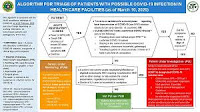The Office of Civil Rights of US DHHS has ruled in two cases out of Pennsylvania (4/16/20) and Tennessee (6/26/20) that triage guidelines with explicit exclusion criteria violate the law. Most triage policies were written with exclusion criteria for a good reason: to provide objective, evidence-based criteria for allocating scarce medical resources. The rationale is to avoid ad hoc bedside decisions that might be discriminatory as well as to maximize the benefit of those scarce resources by directing them away from patients who are likely to die with or without them.
The message from OCR is that exclusion criteria have the potential to violate laws that OCR is tasked with enforcing federal civil rights laws, "including Section 504 of the Rehabilitation Act of 1973, Title II of the Americans with Disabilities Act, and Section 1557 of the Patient Protection and Affordable Care Act, among others."
I have been in conversations with care providers who interpret the OCR decisions to require an abandonment of exclusion criteria. I think that misinterprets the OCR position. What OCR seems to be against is a set of "blanket" exclusion criteria that apply across the board to all patients. This simply moves the decision making from the regional or hospital triage guidelines to the bedside. Wise hospital counsel should be encouraging individual departments (starting with critical care) to develop a checklist of comorbidities that need to be considered in situ -- taking into account all of the facts and circumstances of an individual patient's situation -- in making a decision to offer a scarce resource or to deny it.
